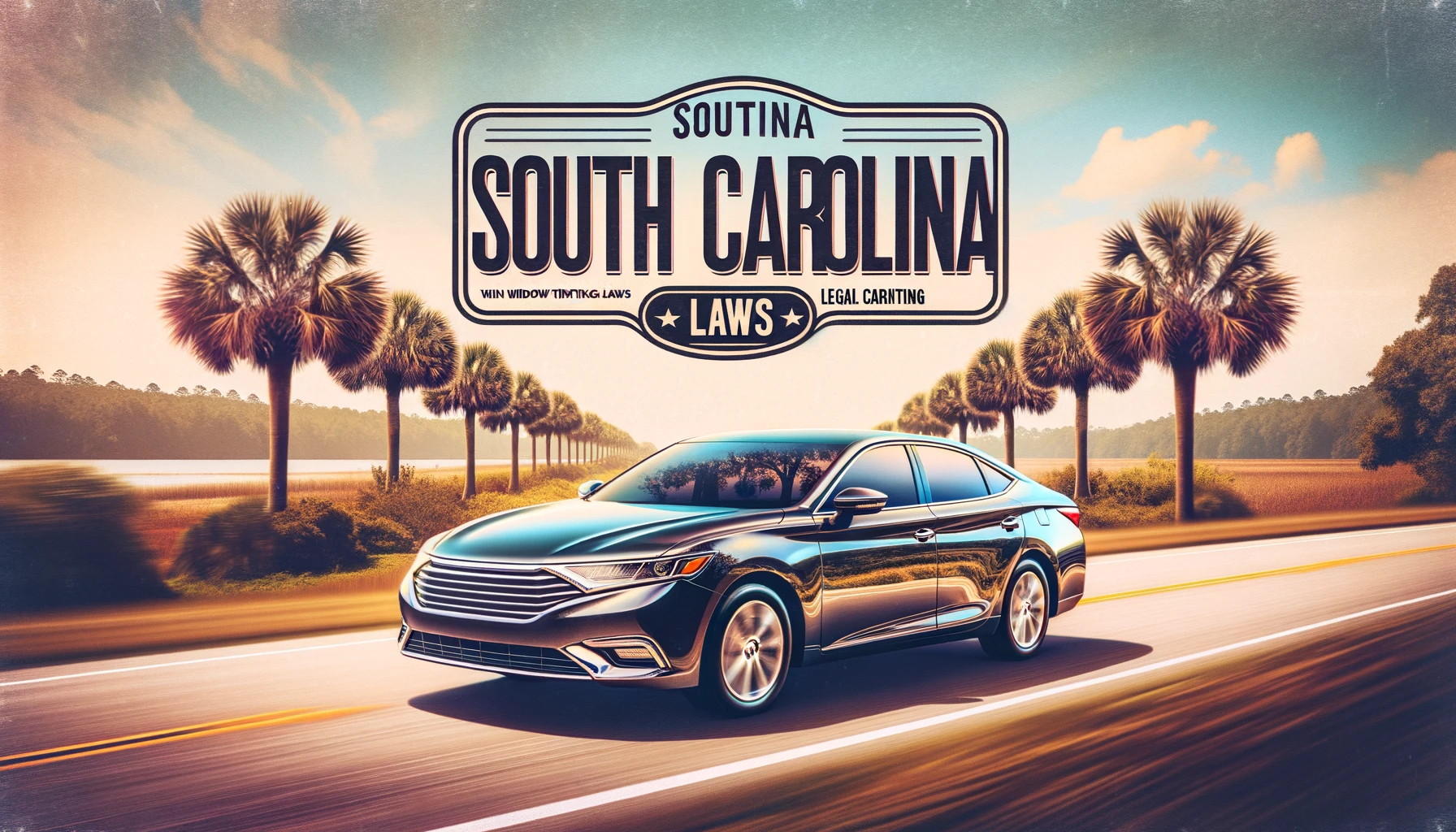Darkest legal tint for Sedans in South Carolina
- Windshield: Non-reflective tint allowed on the top 3 inches.
- Front Side windows: Must allow more than 27% of light in.
- Back Side windows: Must allow more than 27% of light in.
- Rear window: Must allow more than 27% of light in.
Darkest legal tint for SUV and Vans in South Carolina
- Windshield: Non-reflective tint allowed on the top 3 inches.
- Front Side windows: Must allow more than 27% of light in.
- Back Side windows: Must allow more than 27% of light in.
- Rear window: Must allow more than 27% of light in.
South Carolina Tinting Regulations
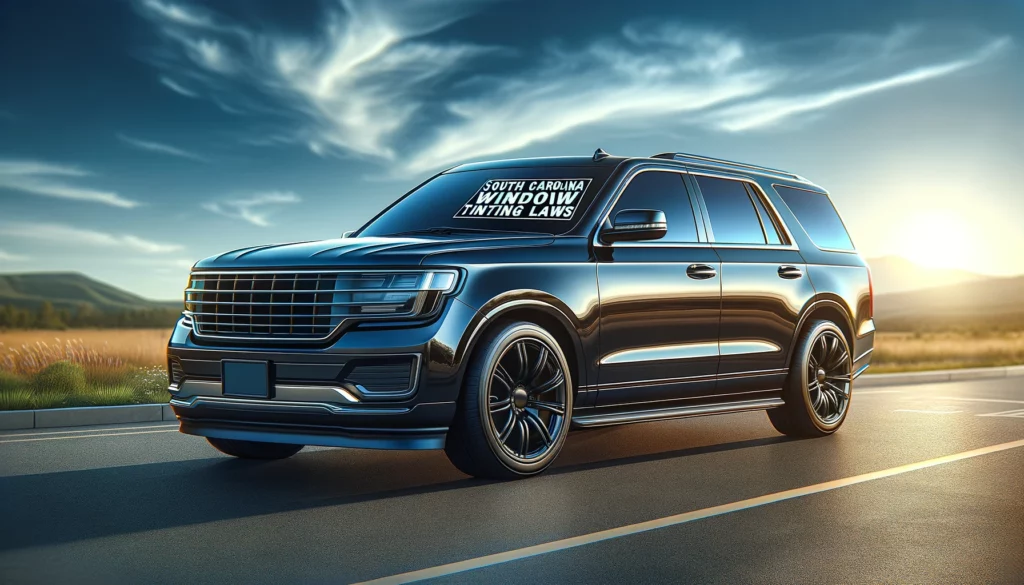
South Carolina has specific regulations when it comes to how dark or reflective your car’s window tint can be. These laws ensure that drivers have clear visibility, and law enforcement officers can see inside vehicles for safety reasons.
Reflectivity Rules:
In South Carolina, window tint can’t just be dark; it also has to adhere to reflectivity rules.
- For Both Sedans and SUVs/Vans: The front and back side windows must be non-reflective. The state law remains a bit vague on the exact levels, but the key takeaway is to avoid mirror-like tints.
Local Interpretations Matter
One crucial thing to remember is that while these are state laws, they might be interpreted differently depending on your county or place of residence in South Carolina. Always double-check with local authorities or legal experts when seeking specific regulations and compliance.
Medical Exemptions for South Carolina Tint Laws
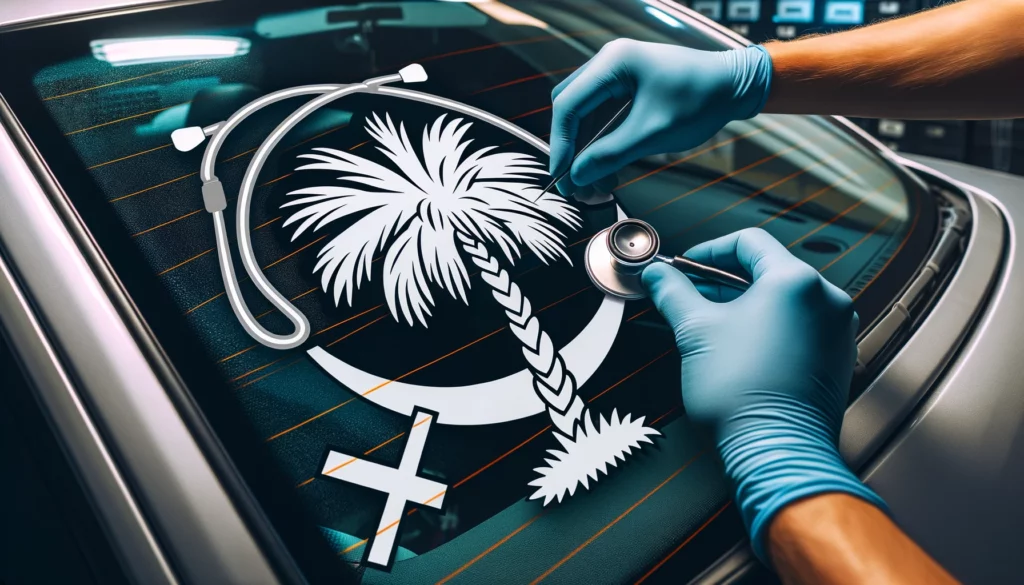
While most of us appreciate window tints for the privacy and coolness they offer, for some, it’s a medical necessity. Certain medical conditions make individuals more sensitive to sunlight. For them, the standard tinting might not be enough to protect against harmful UV rays or the brightness of the sun.
South Carolina’s Medical Exemption Rules
In South Carolina, there’s a provision for those who require darker tints due to medical reasons:
- Certification Requirement: The driver must obtain a written certification from an optometrist or a physician. This certification should clearly indicate that the special window treatment or application is a medical necessity for the individual.
Other Important Tinting Rules to Remember
While the medical exemption allows for darker tints, there are still some regulations to keep in mind:
- Side Mirrors: If a vehicle has a rear tinted window, it must be equipped with side mirrors.
- Tint Reflection: The tint applied should be non-reflective.
- Color Restrictions: Tints in red, yellow, and amber are prohibited in South Carolina.
- Certification Label: The window tint should have a certification label, indicating its compliance with state regulations.
Benefits of Window Tinting
Beyond the medical reasons, window tinting offers several benefits:
- Protection from UV Rays: Tints can block up to 99% of harmful UV rays, protecting both the car’s occupants and its interiors.
- Cooler Interiors: Tints can reduce the internal temperature of a car by up to 60%, making those summer drives more comfortable.
- Enhanced Privacy: Darker windows can deter prying eyes, offering occupants more privacy.
- Reduced Glare: Tints can significantly reduce the sun’s glare, making driving safer.
Window Film Certificates and Stickers In South Carolina
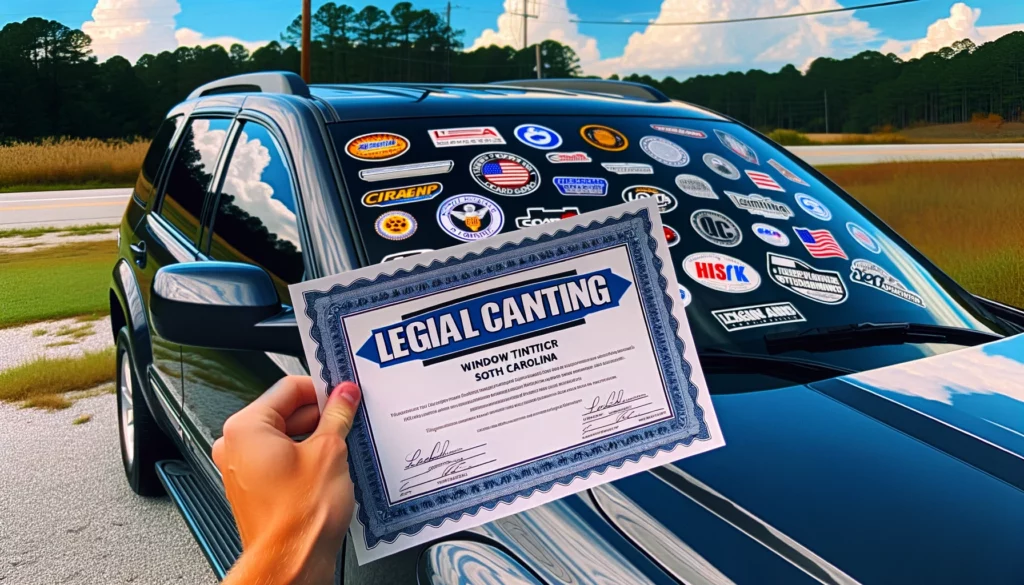
Window tints are not just about aesthetics or keeping the car cool. In South Carolina, they’re regulated by specific laws to ensure the safety of both the driver and others on the road. Certificates and stickers serve as a testament that the vehicle’s window tints comply with the state’s regulations.
The Certificate of Compliance
In South Carolina, every tinted window must have a certificate of compliance. This certificate is a nod to the fact that the window tint adheres to the state’s guidelines. But what does this entail?
- Film Manufacturers: They need to certify the film they sell in South Carolina. So, if you’re getting your car windows tinted, it’s a good idea to check with your dealer if they’re using certified film.
- Sticker Placement: The sticker identifying legal tinting is required to be placed between the film and glass on each tinted window. This ensures that it’s visible and can be checked by law enforcement if needed.
Medical Exemptions and Stickers
South Carolina also provides medical exemptions for special tints. If someone has a medical condition that necessitates darker window tints, they can get an exemption. However, they must have the necessary documentation, and the sticker on the window will indicate this exemption.
Other Important Aspects to Remember
While the focus here is on certificates and stickers, it’s essential to remember a few other related regulations:
- Side Mirrors: If the back window is tinted, the vehicle must have dual side mirrors.
- Restricted Colors: South Carolina law prohibits tint colors like red, amber, and yellow.
- Penalties: Non-compliance with the state’s tinting regulations can lead to penalties. This could be a misdemeanor with a minimum $200 fine or even 30 days in prison for each offense.
Penalties or Ticket Cost for Illegal Window Tint in South Carolina
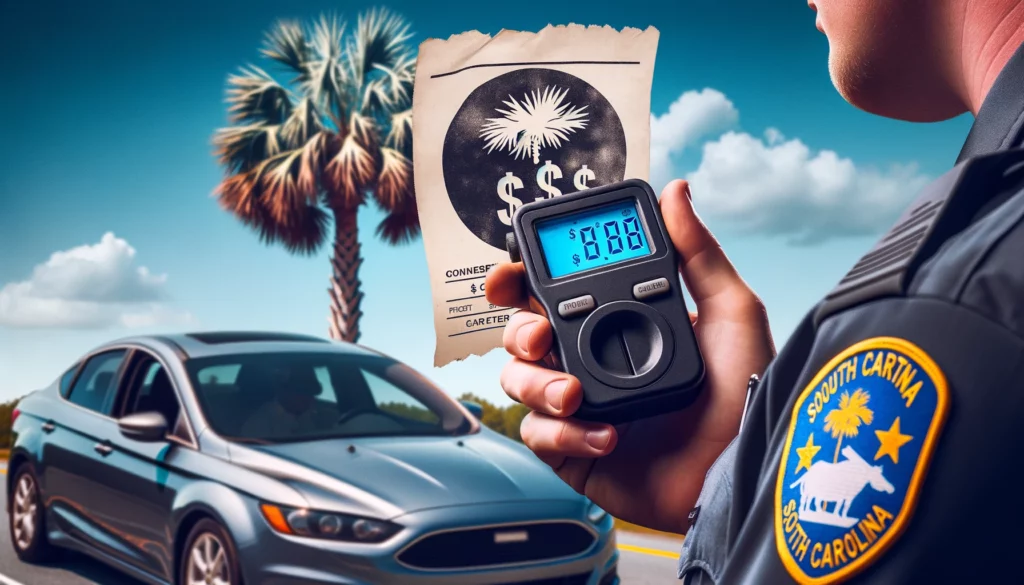
Window tints aren’t just about aesthetics. They offer protection from harmful UV rays, reduce heat inside the car, and provide privacy. However, for safety reasons, especially ensuring clear visibility for drivers and law enforcement, South Carolina has set specific regulations on how dark or reflective these tints can be.
The Cost of Non-Compliance
If you’re thinking of bypassing these regulations, think again! The state has penalties in place for those who don’t adhere to the rules:
- First-Time Offenders: If you’re caught with illegal window tints for the first time, you can expect a ticket fee of $100. But that’s not all. There might be additional court costs and fines, depending on the severity of the violation.
- Repeat Offenders: If you haven’t learned your lesson the first time and are caught again, the ticket fee can rise to over $200. And yes, the court costs and additional fines still apply.
- Professional Tinters Beware: For those in the business of applying window tints, the stakes are even higher. If caught applying illegal tints, professionals can face fines up to $1,000. The state takes these offenses seriously, ensuring that those providing the service are also held accountable.
The Bigger Picture
While the immediate cost of a ticket can be a pinch on your wallet, there are other implications to consider:
- Insurance Impact: Illegal window tints can potentially affect your car insurance premiums. Some insurance companies might view non-compliance with state regulations as a risk, leading to increased rates.
- Resale Value: If you’re planning to sell your car, illegal tints can reduce its market value. Potential buyers might factor in the cost of removing the tint or the risk of getting fined.
Conclusion
South Carolina’s window tinting laws are in place for the safety and well-being of everyone on the road. While they might seem stringent, they strike a balance between the benefits of tinting and the necessities of safety. So, the next time you’re cruising down a South Carolina highway, you can do so with the confidence that you’re in compliance with the law.
State of South Carolina Info
South Carolina! A state that boasts a rich history, diverse landscapes, and a culture that’s both vibrant and welcoming. Nestled in the Southeastern United States, South Carolina is a gem waiting to be explored. Let’s embark on a journey to uncover the many facets of this beautiful state.
Geographical Wonders
South Carolina is bordered to the north by North Carolina, to the south and west by Georgia, and to the east by the majestic Atlantic Ocean. Its diverse landscapes range from the Blue Ridge Mountains in the west to the sprawling coastal plains and beaches in the east.
Historical Significance
South Carolina has been a witness to many pivotal moments in American history. From the first shots of the Civil War at Fort Sumter to the significant battles and events of the Revolutionary War, the state has stories etched in every corner.
Cultural Melting Pot
The state’s culture is a beautiful blend of Native American, African, and European influences. This rich tapestry is evident in its music, dance, festivals, and even its cuisine. From the Gullah traditions of the Lowcountry to the bluegrass tunes of the Upstate, South Carolina is a celebration of diversity.
Major Cities and Attractions
- Columbia: The capital and the largest city, Columbia is the epicenter of politics, education, and commerce in the state.
- Charleston: Known for its historic charm, cobblestone streets, and antebellum architecture, Charleston is a city that transports you back in time.
- Myrtle Beach: A popular tourist destination, Myrtle Beach offers sandy shores, amusement parks, and a bustling boardwalk.
- Greenville: Nestled in the foothills of the Blue Ridge Mountains, Greenville boasts a vibrant downtown, scenic parks, and a thriving arts scene.
Economic Landscape
South Carolina has a robust economy driven by sectors like manufacturing, agriculture, tourism, and aerospace. The state is home to major corporations, and its ports play a crucial role in facilitating international trade.
Education and Innovation
The state is home to several renowned educational institutions, including the University of South Carolina and Clemson University. These hubs of learning have been instrumental in driving research, innovation, and fostering a skilled workforce.
Frequently Asked Questions
How reflective can the window tint be in South Carolina?
The window tint for both sedans and SUVs/vans in South Carolina must be non-reflective. The state law does not specify exact reflectivity levels.
Where can I find the official South Carolina window tinting regulations?
The official regulations and guidelines can be found at South Carolina Tinting Laws.
Can local regulations in South Carolina differ from state tinting laws?
Yes, South Carolina tinting laws and regulations might be interpreted differently depending on your county or place of residence. It’s recommended to double-check with local DMV or law enforcement authorities.
